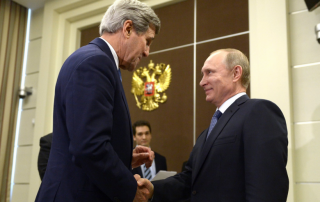Can U.S.-Russia Relations Be Repaired?
When NATO expansion was promoted by the Clinton administration in the 1990s, George F. Kennan warned that it would inevitably antagonize Russia and lead to a new era of tension between East and West. Today, in the wake of Russia’s annexation of Crimea and rising tensions between Washington and Moscow, his prediction seems as though it’s being fulfilled. The echoes of Cold War confrontation are resounding in both capitals.
Enter the newly formed American Committee for East-West Accord, a nonpartisan organization that seeks to promote what amounts to a new détente with Russia. Its name quite deliberately evokes the Committee on East-West Accord, which was founded in 1974 to champion détente and included George F. Kennan among its members. Today’s committee includes former senator Bill Bradley, former ambassador William J. vanden Heuvel, former ambassador Jack F. Matlock, Jr. and the scholar Stephen F. Cohen.
The committee says it hopes to encourage a vigorous debate about Russia. It also calls, among other things, upon Moscow and Washington to restore cooperation on the 1991 Nunn-Lugar Cooperative Threat Reduction Program and for the United States, NATO and Russia to reactivate the NATO-Russia Council. In its mission statement, the committee warns, “While experts warn of an unfolding new nuclear arms race, and with it the risk those weapons may actually be used, there may already be less East-West cooperation than existed during the latter decades of the preceding cold war.”
The very existence of the committee underscores the extent to which U.S.-Russia relations have gone back to the future. Only a decade ago, it would have seemed improbable that relations would deteriorate as much as they have. In the most recent issue of the National Interest, Graham Allison and Dimitri K. Simes meticulously analyze the anfractuosities of this contentious relationship. They caution that both sides could be inadvertently “stumbling” to war.
They conclude,
To recognize the potentially catastrophic consequences of war with Russia does not require paralysis in addressing the challenge of a resurgent but wounded Russia. The United States has a vital interest in maintaining its credibility as a superpower and in assuring the survival and security of its NATO alliance—and thus of every one of its NATO allies. Moreover, in international politics, appetites can grow quickly if fed by easy victories.
The Russian president’s currently limited objectives in Ukraine could become more expansive if Russia does not face serious resistance. After all, the smooth annexation of Crimea led to an outburst of triumphalist rhetoric in Moscow about creating a new entity, Novorossiya, which would include eastern and southern Ukraine all the way to the Romanian border. The combination of resistance by local populations, the Ukrainian government’s willingness to fight for its territory, and U.S. and EU sanctions quickly persuaded the Russian leadership to curtail this line of thinking. When a nation is prepared to fight for important interests, clarity about that determination is a virtue in discouraging potential aggression.
Yet the United States should be careful to avoid giving allies or friends—like Kiev—the sense that they have a blank check in confronting Moscow.
In the forthcoming issue of the National Interest, Council on Foreign Relations president emeritus Leslie H. Gelb is featured in a cover story that adds an important perspective on the U.S.-Russia dynamic. He calls for a sober policy of “détente plus," in which each Russia is not treated "as an enemy, but as combination of adversary and partner." The coming year will reveal whether a new rapprochement is effected or whether relations will continue to deteriorate.
Jacob Heilbrunn is editor of The National Interest.
Image: kremlin.ru

